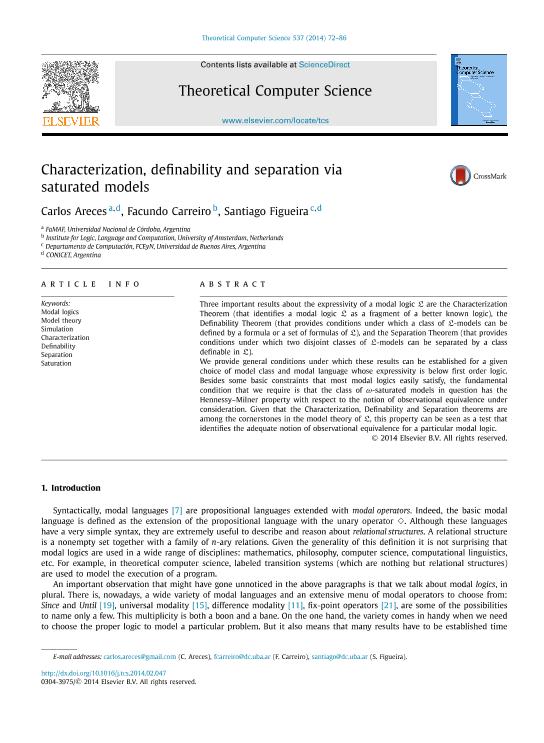Mostrar el registro sencillo del ítem
dc.contributor.author
Areces, Carlos Eduardo

dc.contributor.author
Carreiro, Facundo Matias

dc.contributor.author
Figueira, Santiago

dc.date.available
2018-01-02T18:02:17Z
dc.date.issued
2014-06
dc.identifier.citation
Figueira, Santiago; Carreiro, Facundo Matias; Areces, Carlos Eduardo; Characterization, definability and separation via saturated models; Elsevier Science; Theoretical Computer Science; 537; 6-2014; 72-86
dc.identifier.issn
0304-3975
dc.identifier.uri
http://hdl.handle.net/11336/32004
dc.description.abstract
Three important results about the expressivity of a modal logic L are the Characterization Theorem (that identifies a modal logic L as a fragment of a better known logic), the Definability Theorem (that provides conditions under which a class of L-models can be defined by a formula or a set of formulas of L), and the Separation Theorem (that provides conditions under which two disjoint classes of L-models can be separated by a class definable in L). We provide general conditions under which these results can be established for a given choice of model class and modal language whose expressivity is below first order logic. Besides some basic constraints that most modal logics easily satisfy, the fundamental condition that we require is that the class of ω-saturated models in question has the Hennessy–Milner property with respect to the notion of observational equivalence under consideration. Given that the Characterization, Definability and Separation theorems are among the cornerstones in the model theory of L, this property can be seen as a test that identifies the adequate notion of observational equivalence for a particular modal logic.
dc.format
application/pdf
dc.language.iso
eng
dc.publisher
Elsevier Science

dc.rights
info:eu-repo/semantics/openAccess
dc.rights.uri
https://creativecommons.org/licenses/by-nc-sa/2.5/ar/
dc.subject
Modal Logics
dc.subject
Model Theory
dc.subject
Simulation
dc.subject
Characterization
dc.subject
Definability
dc.subject
Separation
dc.subject
Saturation
dc.subject.classification
Ciencias de la Computación

dc.subject.classification
Ciencias de la Computación e Información

dc.subject.classification
CIENCIAS NATURALES Y EXACTAS

dc.title
Characterization, definability and separation via saturated models
dc.type
info:eu-repo/semantics/article
dc.type
info:ar-repo/semantics/artículo
dc.type
info:eu-repo/semantics/publishedVersion
dc.date.updated
2017-12-29T14:19:56Z
dc.journal.volume
537
dc.journal.pagination
72-86
dc.journal.pais
Países Bajos

dc.journal.ciudad
Amsterdam
dc.description.fil
Fil: Areces, Carlos Eduardo. Universidad Nacional de Córdoba. Facultad de Matemática, Astronomía y Física; Argentina. Consejo Nacional de Investigaciones Científicas y Técnicas; Argentina
dc.description.fil
Fil: Carreiro, Facundo Matias. University of Amsterdam; Países Bajos
dc.description.fil
Fil: Figueira, Santiago. Universidad de Buenos Aires. Facultad de Ciencias Exactas y Naturales. Departamento de Computación; Argentina. Consejo Nacional de Investigaciones Científicas y Técnicas; Argentina
dc.journal.title
Theoretical Computer Science

dc.relation.alternativeid
info:eu-repo/semantics/altIdentifier/doi/http://dx.doi.org/10.1016/j.tcs.2014.02.047
dc.relation.alternativeid
info:eu-repo/semantics/altIdentifier/url/http://www.sciencedirect.com/science/article/pii/S030439751400173X
Archivos asociados
